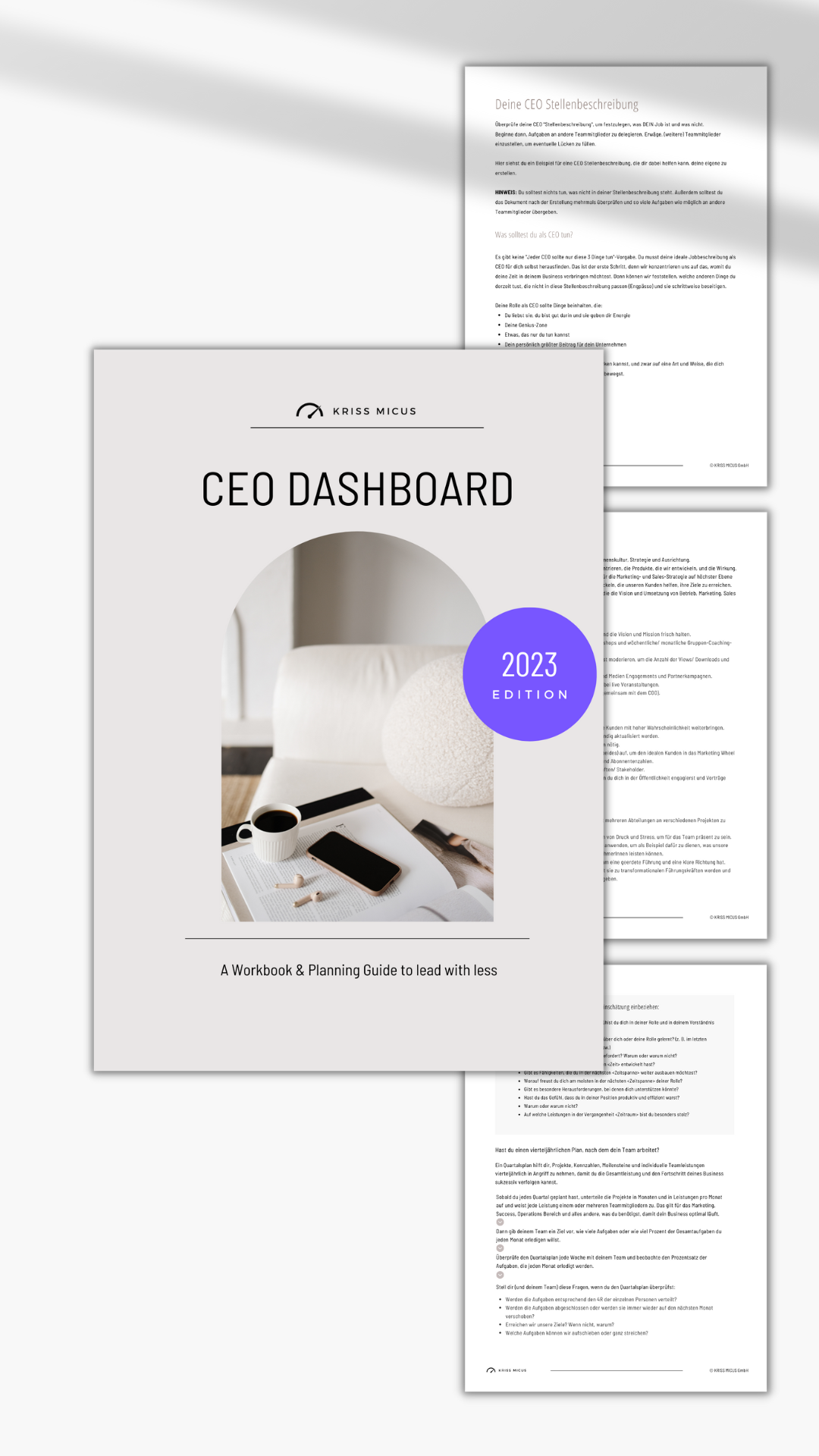How to start a Consulting Business
Part 03/06
Welcome to part three of our six-part series on "How to Start a Consulting Business - A Comprehensive Guide for Beginners." We will explore essential topics for delivering quality service.
This includes building long-term relationships, investing in marketing, and evaluating and adjusting your business strategy. Additionally, we will look at utilizing the modern digital environment to automate and remotely streamline your consulting business.
This guide has provided useful information and steps to help you start and run a successful consulting business. We have given you in-depth insights to help you understand the complexities of this process. We have also provided practical steps to ensure your success.
We have discussed the basics of starting a consulting business. This includes finding your specialty, creating a business plan, learning the legal aspects, and establishing your brand.
Part three expands upon the foundations discussed before. We will explore the elements that will determine the success and longevity of your consulting business. Quality service ensures client satisfaction and establishes your reputation as a trusted advisor. Building long-term relationships fosters loyalty, referrals, and sustained growth.
Investing in marketing is vital for attracting new clients and staying competitive. Evaluating and adjusting your business strategy allows you to adapt to market dynamics and position your business for continued success.
Additionally, we will explore how to utilize the modern digital environment to automate and remotely streamline your consulting business. Technology and digital tools can increase efficiency. This can enable remote work arrangements. It also improves communication and collaboration with clients and team members.
You will be successful in the consulting industry in 2023 and beyond. To do this, you must master the core elements and take advantage of the digital environment.
Now, we will explore the last section of our guide. We will uncover strategies and insights that will set you on the path to consulting excellence. Additionally, we will embrace the advantages of the digital age.
CEO Dashboard
A workbook and planning guide, for CEOs who want to do more with less.
→ CEO Checklist
→ Growth Audit
→ Financial Audit
and more

Delivering Quality Service
The success of your consulting business heavily relies on the quality of service you deliver. It is important to keep in mind that the work you produce reflects your brand.
Aim to exceed client expectations and deliver results within the stipulated timeline. Maintain a high standard of professionalism and be sure to communicate effectively with your clients.
Always deliver the best possible service to your clients.
Keep learning and staying updated with trends and best practices in your field.
Seek feedback from clients and use it to improve your services.
Understand Your Client's Needs
Schedule initial consultations to thoroughly understand your client's challenges and goals.
Regularly check in to stay updated on any changes or new objectives.
Provide Tailored Solutions
Avoid a one-size-fits-all approach. Tailor your consulting services to address each client's unique needs and goals.
Example: Analyze clients' current processes to improve their business operations. Identify any bottlenecks. Propose specific changes based on their context.
Maintain Professionalism
Keep your communication clear, timely, and respectful.
Always honor your commitments and deadlines.
Stay Up-to-Date
Always consistently enhance your skills and expertise to offer the most pertinent guidance.
Adapt your strategies as industry trends, technologies, and best practices evolve.
Deliver Measurable Results
Track and document the impact of your consulting services.
Example: As a marketing consultant, presenting clients with statistics showing your guidance's positive results is important. This could include increased engagement or sales due to your social media strategy.
Provide Exceptional Customer Service
Ensure you understand what they are asking and provide accurate and helpful answers.
Show appreciation for their business through thank-you notes, follow-ups, and the occasional special offer.
Constantly enhance by seeking feedback.
Ask clients for their feedback on your services.
Use their responses to identify areas of improvement and implement necessary changes.
Example: Conduct client satisfaction surveys at the end of each project to gauge your performance and identify areas for improvement.
Focus on these steps to ensure consistent quality service to your clients. This is essential for the longevity and reputation of your consulting business.
Building Long-Term Relationships
Developing strong relationships with your clients is beneficial. It can lead to repeat business and referrals. These are essential for expanding your consulting business.
Be sure to engage with your clients regularly, seek feedback, and address any concerns promptly. Remember, client satisfaction is the cornerstone of a thriving consulting business.
For your consultancy business to remain viable and grow, it is crucial to establish long-lasting relationships with your customers.
These relationships can lead to repeat business, referrals, and a solid reputation in your industry. Here's how you can foster lasting relationships with your clients:

Understand Your Client's Business and Industry
Dive deep into your client's industry, business model, and culture. This understanding shows your commitment and enables you to provide more relevant and valuable services.
Maintain Regular Communication
Keep the lines of communication open even after the completion of a project.
Update clients on relevant industry news or trends. This demonstrates that you're actively thinking about their business.
Provide Ongoing Value
Offer value beyond the initial project. This could be through insightful articles, industry updates, or free webinars.
Invite clients to networking events or introduce them to contacts that could benefit their business.
Be Reliable and Consistent
Always deliver your services on time and meet your commitments.
Consistency in quality and delivery builds trust, which is the foundation of a long-term relationship.
Show Genuine Interest and Care
Show interest in your clients as individuals. Learn about their motivations, challenges, and aspirations.
Acknowledge important occasions like business anniversaries or personal milestones.
Seek and Act on Feedback
Regularly ask for feedback on your services.
Make necessary improvements based on the feedback to show that you value their opinions.
Provide Excellent Customer Service
Be responsive to client inquiries and concerns. Quick responses show that you respect their time.
Ensure that every interaction with your business leaves them feeling valued and satisfied.
Following these steps can build strong, long-term relationships with your clients.
Aim to be a trustworthy advisor who provides continuous value to your business. Do not merely be a one-time service provider.
Investing in Marketing
Investing in marketing strategies is important to reach a wider audience and attract more clients. Build a strong online presence through your website and social media. Explore other digital marketing strategies, such as email marketing, content marketing, and pay-per-click advertising.
Traditional marketing strategies such as networking, public speaking, and print advertising can also be beneficial.
Marketing is vital for any consulting business. It helps attract new clients, retain existing ones, and establish your brand in the industry. Here are some marketing strategies you can invest in for your consulting business:
Building a Professional Website
Your website is often the first impression potential clients have of your business. Ensure it's well-designed, user-friendly, and showcases your services, expertise, and client reviews.
Implementing Search Engine Optimization (SEO)
Optimizing your website for search engines can help you attract organic traffic.
Invest in keyword research, create SEO-friendly content, and ensure your website is technically optimized.
Leveraging Content Marketing
Create high-quality blog posts, ebooks, white papers, and content relevant to your target audience.
This showcases your expertise and helps improve your website's SEO.
Utilizing Social Media Marketing
Establish a presence on social media platforms where your potential clients will likely be.
Regularly share valuable content, engage with your audience, and promote your services.
Investing in Email Marketing
Build an email list and send regular newsletters with industry updates, helpful tips, and information about your services.
Personalize your emails to improve engagement and conversion rates.
Networking at Industry Events
Attend conferences, seminars, and networking events in your industry.
These events are excellent opportunities to meet potential clients and establish your presence in the industry.
Using Paid Advertising
Consider paid advertising options like Google Ads or social media ads to reach a wider audience.
Retargeting ads can be particularly effective for reaching people who have already shown interest in your services.
Encouraging Client Referrals
Happy clients can be excellent sources of new business. Encourage them to refer your services to others.
Consider setting up a referral program that offers incentives for client referrals.
Remember, effective marketing requires consistent effort and adjustments based on what's working and what isn't. Be prepared to adapt your marketing strategies as you learn more about your audience and what resonates with them.
Utilizing the Modern Digital Environment to Automate and Remotely Streamline
Today's digital era provides consultants with access to many tools and technologies. These tools can help to streamline operations, automate tasks, and even enable remote work arrangements. Embracing these advancements can significantly enhance your consulting business's efficiency and productivity. Here are the steps to utilize the modern digital environment effectively:
Adopt Project Management Tools
Utilize project management tools to organize tasks, track progress, and collaborate with clients and team members. Tools like Trello, Asana, or Basecamp help streamline workflows and ensure efficient project execution.
Automate Routine Tasks
Identify repetitive tasks that can be automated to save time and reduce errors. Automation tools such as Zapier or IFTTT can integrate various applications and automate data transfers, email notifications, and other manual processes.

Embrace Cloud-Based Solutions
Leverage cloud-based solutions for document storage, data backup, and collaboration. Platforms like Google Drive, Dropbox, or Microsoft OneDrive allow easy access to files from anywhere, promoting remote work flexibility.
Implement Virtual Meeting and Communication Tools
Use video conferencing tools like Zoom, Microsoft Teams, or Google Meet to conduct virtual client meetings, team collaborations, and workshops. Efficient communication platforms like Slack or Microsoft Teams enable real-time communication and enhance remote collaboration.
Optimize Online Security
Establishing strong security protocols is imperative to safeguard your digital possessions and customer information. To ensure the protection of sensitive information, it is advisable to use password managers, encryption tools, and two-factor authentication.
Develop Remote Work Capabilities
Leverage remote work arrangements to expand your client base and access talent from anywhere. Explore remote collaboration tools, time-tracking software, and virtual team management platforms to facilitate seamless remote work.
Leverage Digital Marketing Strategies
Increase your presence online by using digital marketing strategies like SEO, content marketing, social media ads, and email marketing. These tactics will help you to maximize your online presence.
These strategies can enhance brand visibility and attract clients from various locations.
By embracing the modern digital environment, consultants can automate time-consuming tasks, streamline operations, and adapt to the remote work trend. These strategies will optimize your business processes and allow you to deliver services efficiently, regardless of location limitations.
Evaluating and Adjusting Your Business Strategy
Finally, don't forget to evaluate and adjust your business strategy regularly. The market can change rapidly, and you must be adaptable to stay relevant. Regularly review your business performance, identify areas of improvement, and make necessary changes to your business plan.
As your consulting business grows and evolves, so should your business strategy. Regularly evaluating and adjusting your strategy ensures your business stays competitive, efficient, and profitable. Here are the steps you should take to evaluate and adjust your business strategy effectively:
Set Clear, Measurable Goals
Goals give you a target to aim for and a benchmark to measure your success. Ensure they are SMART (Specific, Measurable, Achievable, Relevant, Time-bound).
Regularly Review Your Performance
Set a schedule to review your business performance regularly. The frequency of this occurrence may be monthly, quarterly, or yearly.
Identify key performance indicators relevant to your business. Examples include revenue growth, client acquisition rate, client retention rate, and project profitability.
Gather and Analyze Data
Use tools like Google Analytics, CRM systems, or financial software to gather data about your business.
Analyze this data to understand trends, identify strengths and weaknesses, and gauge the effectiveness of your strategies.
Conduct a SWOT Analysis
Evaluate your Strengths, Weaknesses, Opportunities, and Threats regularly.
This analysis provides a comprehensive overview of your business and the external environment, helping you make strategic decisions.
Seek Feedback
Regularly seek feedback from clients, employees, and other stakeholders. Their insights can reveal blind spots and provide ideas for improvement.
Stay Informed About Market Trends
Keep up-to-date with changes in your industry, emerging trends, and shifts in customer preferences.
This knowledge will help you adapt your strategies to stay competitive and relevant.
Make Necessary Adjustments
Based on your evaluations, make necessary adjustments to your business strategy.
This could involve changing your marketing strategy, offering new services, improving client relations, or refining your operations.
Remember, adjusting your strategy isn't a sign of failure; it's an integral part of business growth. Businesses that adapt are the ones that survive and thrive in the ever-changing business landscape. Regularly evaluating and adjusting your business strategy will keep your consulting business agile, relevant, and successful.
Conclusion
Starting a consulting business requires strategic planning, market understanding, and an unwavering commitment. Being your boss, setting your hours, and sharing your expertise with others can be rewarding. This journey can be worthwhile.
This comprehensive guide should act as a starting point for your venture into consulting. By implementing these strategies and best practices, you'll be well on your way to launching and growing a successful consulting business.
Your consulting business will surely thrive with a clear understanding of your goals, careful planning, and consistent effort.
Let us guide you the way.
